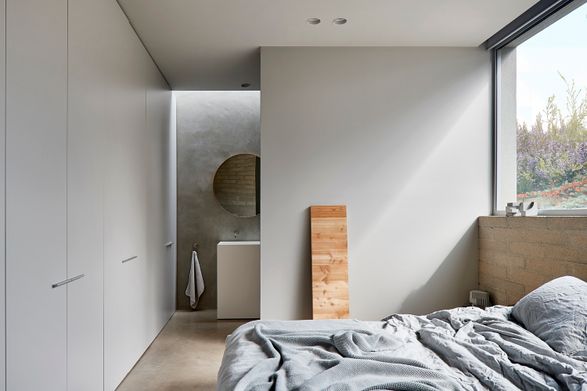
Ruxton Residence / studiofour
ARCHITECTS
Studiofour
DESIGN TEAM
Sarah Henry, Annabelle Berryman
CLIENTS
Sarah Henry
MANUFACTURERS
Autodesk, Mark Tuckey, Adobe Systems Incorporated, Concrete Floor, National Masonary Company, Policrete, Render It Oz, Trimble Navigation
CONSULTANTS
Uwood Projects
LANDSCAPE
Studiofour
ENGINEERING
Webb Consult
PHOTOGRAPHS
Shannon Mcgrath
AREA
180 M²
SITE AREA
400 M2
YEAR
2019
LOCATION
Melbourne, Australia
CATEGORY
Houses
Ruxton Rise Residence is based on the clients’ three key values for life; family, health, and integrity.
The objective was to create a little bit of something precious rather than a lot of something mediocre.
At its core, the design for this home was based on an exploration into our clients desired way of living and providing the physical framework necessary for this ideal, and for the families’ beliefs to be realized.
The brief for this home was to celebrate the beauty in the ordinary things of everyday life and the design was led by the fundamental principle that simplicity enables idleness, and the time we spend idle makes for a healthier state of mind. When we are idle, we want less and are more at peace when we get it.
Descending from the street front, down a narrow stair, the internal garden is unveiled as one enters the building.
The house envelopes the central garden, connecting all internal living spaces, and turning the experience of the home from inside to out.
The deep fascia to the courtyard blocks out views of the surrounding neighboring houses while maintaining views of the significant cedar trees beyond.
Creating a courtyard house with expansive glazing and opportunities for spilling outdoors, the inhabitants can synchronize themselves with their surrounding natural environment, and reconnect with the undulation of the day and the restorative power of sunlight.
The landscape, and its movement and shadows, provide a calming effect that permeates the whole house.
Honesty in the design was sought and this led to humility and integrity in the built fabric.
The focus was on the experience rather than the form, and all importance was placed on this quality of experience rather than any visual statement.
Materials and building techniques were selected for their honesty, as well as their ability to patina over time, as it is important a house gets more beautiful as it ages.
By reducing the footprint to what is necessary and by relying on authentic honest materials and construction techniques, the budget could be redirected towards the creation of a passive home, minimizing ongoing costs, both financial and environmental.

























